Economic Justice
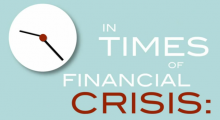
Rep. Paul Ryan’s (Chairman of House Budget Committee) FY2012 plan, A Roadmap for America’s Future, garnered princely praise in early April 2011, but it was quickly trailed by intense scrutiny when Ryan’s botched math and skewed priorities became apparent upon his budget’s review. Hailed as visionary and courageous upon submission, Ryan’s budget plan ultimately revealed his ideologically entrenched disregard for the poor.
A few weeks ago President Barack Obama announced his FY2013 Budget. Within a few weeks, Ryan will submit his FY2013 budget plan for review. Dr. Ronald J. Sider’s new book, Fixing the Moral Deficit (February 2012), comes just in time!
Sider has offered practical, balanced, and highly informed guidance for Christian engagement in the public sphere since publication of his first and seminal book, Rich Christians in an Age of Hunger (1977). Sider draws from his Just Generosity: A New Vision for Overcoming Poverty in America (Sider, 1999) to lay the philosophical foundation for this latest analysis in Fixing the Moral Deficit.
Sider starts with a simple premise: We have a deficit crisis. We also have a poverty crisis. Together these crises are producing a moral crisis in America.

Here it is, the “resolutionary” iPad3, with breakthrough retina display, quad-core processor and 4G LTE wireless connectivity. This next-generation technology is captivating and if you’re an Apple fan, as I am, you’re going to want to trade in your iPad2 and put your name on the waiting list for the iPad3.
And yet, as a human rights activist, it gives me pause. With the innovation of the iPad 3, comes some critical missing features — including conflict free minerals from eastern Congo. To date, Apple has been a leader on this issue, but I know they can do more.

When it comes to financial advice in these tough economic times, more Americans today would rather take advice from business mogul Donald Trump than from the Bible.
According to a survey conducted in February by two biblically oriented nonprofits, 50 percent of Americans would choose Donald Trump as their financial adviser, despite his history of filing for bankruptcy, and only 32 percent look to the Bible.
"The Bible offers sound advice about managing money, avoiding debt and prospering in difficult times," said Lamar Vest, president of the American Bible Society, co-sponsor of the survey, but 94 percent of Americans are unable to pinpoint the verse from Proverbs about these themes.
The Bible-inspired movement set the standard -- and the inspiration -- for future campaigns for change.
The Bible speaks of a "year of the Lord's favor" -- the year of Jubilee. We need it now more than ever.
The bigger the financial corporation, the quicker your dollar exits your community.
Occupy has already succeeded, its legacy already established: It has changed the conversation.
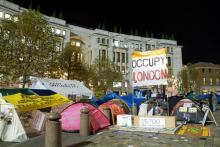
LONDON — Police on Tuesday evicted scores of demonstrators from a makeshift tent city they had erected outside historic St. Paul's Cathedral more than four months ago as part of a global protest against capitalism.
After brief skirmishes in the operation that authorities launched before dawn, 20 protesters were arrested but most reacted largely peacefully as they were moved out.
Police dumped an estimated 150 tents and equipment into waiting garbage trucks. By midday, the former campsite was cleared and the last of its occupiers were leaving.

The question is, are we listening? For God, who hears the prayers of God's people, is calling us to listen as well. God's justice is a collective project.
But when we listen, we hear stories of oppression, corruption, and injustice, in the face of honesty and hard work. But listening is not enough. When we listen, God calls us from the quiet of prayer to be a healing presence in the world.
"She looks well to the ways of her household, and does not eat the bread of idleness." - Proverbs 31:27

Today: As Jesus is traveling around, crowds gather, important leaders want him to come speak in their beautiful churches; all are eager to hear the teacher’s wisdom. Suddenly, as far as the eye can see, there is a huge crowd of children slowly coming toward them. Some are trying to walk, some are crawling, some are being carried. Most are stunted — their bodies and brains haven't developed properly because of a lack of food, and the necessary protein, vitamins, and minerals it provides. All of them — 2.6 million every year — are slowly dying from malnutrition.

Tuesday's New York Times carried a thought-provoking op-ed by David Brooks called "The Materialist Fallacy." I recommend that you read it: it's only 764 words long. Brooks argues that "in the half-century between 1962 and the present, America has become more prosperous, peaceful and fair, but the social fabric has deteriorated." This is not just because of job loss (the liberal explanation) or government intrusiveness (the libertarian explanation) or "the abandonment of traditional bourgeois norms" (the neo-conservative explanation).
It has more to do with declining social context and social capital, says Brooks, who never met a financial capitalist he didn't like. He really likes Charles Murray's new book, however: Coming Apart: The State of White America, 1960-2010. (If you're not up for the 416-page book, you might want to read Brooks's January 30 column in praise of it.) Both authors worry about nefarious social forces that are driving a wedge between rich and poor, productive and non-productive, law-abiding and outlaws.
Brooks is partly right, and so are his critics. Yes, there's a rip in our social fabric. Yes, it is caused or made worse by job loss, ill-advised government programs, and shifting (or abandoned) values. Yes, it diminishes social capital and impoverishes social context. But also, Mr Brooks, and perhaps fundamentally, our decaying social fabric is the direct result of our enthusiastic worship of Mammon--the love of money that is the root of all evil (1 Timothy 6:10).
I don't need to remind anybody about rapacious financiers, bloated CEOs, unscrupulous lobbyists, and corrupt politicians. But there were plenty of those in the 1890s and the 1920s, and, as Brooks points out, the social fabric still stayed more or less intact back then. Even two World Wars and a Great Depression didn't unravel it. People still finished school, still got jobs, and still got married before having children, if not always before getting pregnant. Why did things start to break down in the 60s?

Now we are at Valentine’s Day a year later. For many months last spring, a solitary red heart balloon floated just under the dome of the Capitol. It became a gentle symbol of this powerful people’s uprising.
The red heart balloon can serve as a reminder of how God’s Spirit blows whichever way it will, but that God’s Spirit is a spirit of justice and of compassion. As Bishop Burnside said, voices of faith need both a vocabulary of love and a vocabulary of justice as we move into the highly-charged months ahead.

I’m not a fan of calling things wars that aren’t really wars. As soon as something is labeled a “war”, whether it be the “culture wars” or now the “war on religion,” we severely limit the ways we can move forward and solutions available to us. EJ Dionne in his column today at the Washington Post puts it this way:
Politicized culture wars are debilitating because they almost always require partisans to denigrate the moral legitimacy of their opponents, and sometimes to deny their very humanity. It’s often not enough to defeat a foe. Satisfaction only comes from an adversary’s humiliation.
One other thing about culture wars: One side typically has absolutely no understanding of what the other is trying to say.
How Can You Get Health Insurance if You're American with a Pre-existing Condition? Live Long Enough.
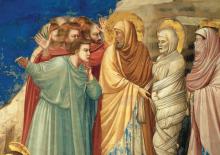
This Sunday is an important milestone for me. It's the day I no longer risk losing health insurance.
I left my last job-with-benefits when I was 51 years old. I'd been commuting an hour and a half each day, and I was worn out. My husband had excellent health insurance, and publishing jobs were plentiful.
Six weeks after my job ended, however, the dot-com bubble burst and jobs everywhere started to dry up. In 2003, I discovered I had a great big pre-existing condition — a defective heart valve and an aortic aneurysm that would eventually require surgery. I became uninsurable except through my husband's employer (and mine, should I ever find another job).
And then in 2008, the year I turned 60, the whole economy tanked. I realized I was now entirely dependent on my husband's employer for health insurance, since I would probably never again have a job-with-benefit.

We missed this announcement last week, but it’s good news and so it’s worth going back a few days for!
There was good news for ethical chocolate lovers last week when Hershey’s announced a number of measures to promote ethical practices in its chocolate production.
“You don’t know what you have here in America, you know?” said the cabby who drove me home from the airport. When his father died in Ethiopia, he had to drop out of his American university where he was studying computer engineering to start driving cabs to support his family back in Ethiopia. Ethiopia has no social safety net.
“In America,” said my cab driver, “you have services and programs that help keep families together in hard times.” He hasn’t seen his family in nine years. His cab-drivers’ salary is hardly enough to pay for a plane ticket to Ethiopia. Besides, if he takes time off, that would be less food, education, and possible eviction for his mother, brothers and sisters.
While it is true that America has a social safety net, it is weaker than it was just forty years ago and it’s come under more intense attack in recent years. The deficit is the justification for shredding the net now. And extremists are pushing the party that claims a lock on “family values” to nullify the programs that protect at-risk American families from slipping into poverty.
In the name of “fiscal responsibility,” the Tea Party-led House GOP passed H.R. 1956, a bill that takes cash from the hands of America’s poorest working families in order to protect the richest of the rich. H.R. 1956 requires workers to present a Social Security Number rather than an IRS issued Individual Tax Identification Number to claim the child tax credit. Seems simple enough, but the bill is crafted to target working immigrant families the hardest, even if they are legal residents or have children that are American citizens. The GOP called this a compromise. H.R. 1956 is what they offered in return for the extension of the Payroll Tax cut. Congress could have paid for that extension by ending the Bush era tax cuts for the wealthiest Americans, which were set to expire on January 1, 2012. But the GOP said absolutely not. Instead, they crafted H.R. 1956.
President Obama connected his faith with his policies toward the poor at the National Prayer Breakfast on Thursday (2/2/12), a subtle but sharp contrast to remarks made by presidential hopeful Mitt Romney the day before.
"Living by the principle that we are our brother's keeper. Caring for the poor and those in need," Obama said before an audience of about 3,000 at the Washington Hilton. These values, he said, "they're the ones that have defined my own faith journey."
Specifically, Obama said, they translate to policies that support research to fight disease and support foreign aid. His faith, he continued, inspires him "to give up some of the tax breaks that I enjoy."
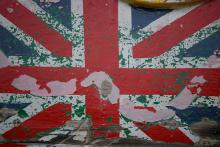
Gandhi once said that "a nation's greatness is measured by how it treats its most vulnerable." Today, it strikes me that the "Great" in Great Britain should probably be quietly dropped, and replaced with "Abject," "Inadequate" or something equally disparaging.
For that is how the UK is currently treating its most vulnerable — the young, the elderly, the disabled — inadequately, abjectly and without compassion. For the last few weeks, a battle has been raging between the government, the legislature, the Church, organizations, and the general public over a piece of legislation called the Welfare Reform Bill.
The bill is wide ranging in its ‘reforms’, covering a myriad of social security measures – from disability benefits, to welfare offered to the unemployed and their families and children. At a time when austerity and budget cutting is front and center of the government’s agenda, ‘reform’ is a by-word for ‘cutbacks’.
The crux of the legislation is an attempt to distinguish between different categories of "the poor," to weed out the “undeserving” from the “deserving.” Sadly, as can be seen from the uproar that the Bill has caused, this attempt has failed.
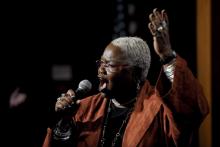
“I woke up this morning with my mind set on justice...”
So sang Sweet Honey In the Rock’s Dr. Ysaye Barnwell this morning. And, sitting in a room with hundreds of activists, occupiers and people of similar persuasions, it was hard not to embrace that mindset.
Maybe it’s a failing of my own, and a comment on my devotion to the 24-hour news cycle, but recently I have lost sight of the excitement and intent that the Occupy movement originally injected into the psyche of the nation.
Blessedly, this morning’s gathering, in the welcoming environment of Church of the Pilgrims in Washington, D.C., was an opportunity to hear once again words of hope, energy and defiance. The People’s Prayer Breakfast was everything I hoped and expected it to be.
It was friendly, optimistic and (as there should be at any good breakfast meeting), there was food aplenty for everyone in the bustling hall beneath the church — a mishmash of young, old, people of different faith traditions and various cultures. A large contingent of students from a local Quaker school injected a youthful optimism into the morning (filling the energy gap that even a strong coffee could not supply at 7:30 a.m.)
The atmosphere was one of peace and contentment. And yet, at the same time, there was urgency in the voices of those who addressed us.